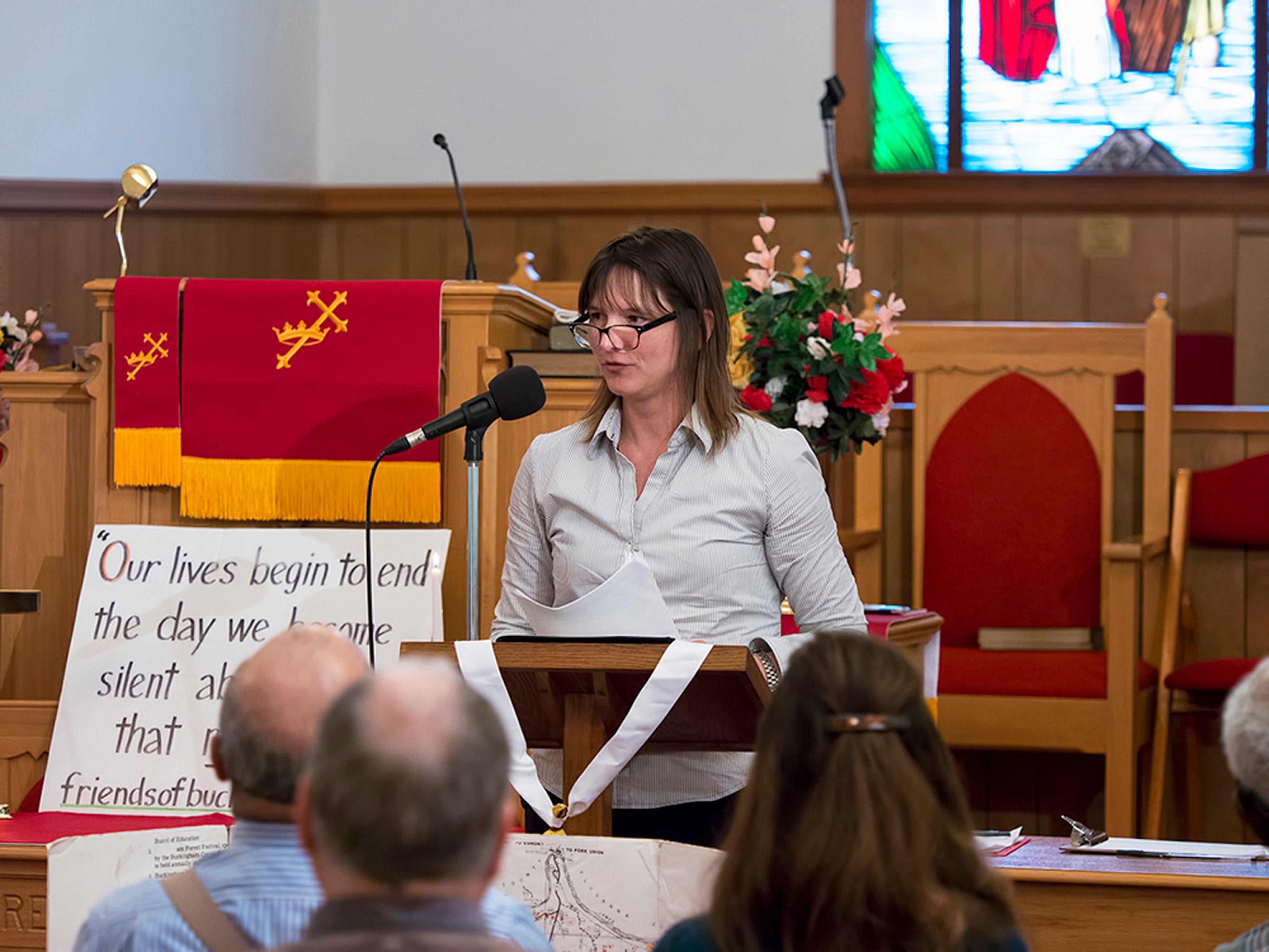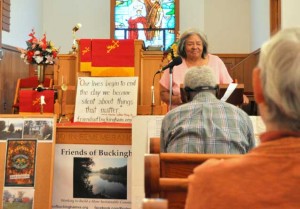Pipeline ‘endangers’ Union Hill
Published 2:09 pm Thursday, May 12, 2016

- Ernest Aubert Sonja Ingram, a field representative for Preservation Virginia, speaks at a church in the Union Hill community — one that could see a 42-inch natural gas pipeline constructed through it, along with a gas-fired compressor station.
The Union Hill community in Buckingham has been named one of Virginia’s most endangered historic places by Preservation Virginia due to the proposed Atlantic Coast Pipeline’s (ACP) proximity to the area.
Dominion and three other partners are seeking federal approval to construct a 42-inch natural gas pipeline through Buckingham County through the Union Hill community, located near Route 56. Dominion plans on constructing an over 53,000 horse power natural gas-fired compressor station near the community. The facility would be constructed between Union Hill and Shelton Store Roads in Buckingham County. The area includes a large population of African Americans.
“Friends of Buckingham is grateful to Preservation Virginia for recognizing the proposed ACP compressor station district Union Hill/Woods Corner as a Most Endangered Historic Place,” said Lakshmi Fjord, a Friends of Buckingham spokeswoman.
“Buckingham County has a richly diverse cultural history, from the Monacans to early Virginia colonial slave plantations, and large population of landowning Freedman. We hope that Virginia statewide awareness and partnerships through the Endangered Places Program will help us to protect our history, rural beauty, farms and forests, clean air, land and water for the generations to come.”
“Post-Emancipation African American settlements and burial sites, like those at Union Hill in Buckingham County, reveal the successes and struggles of generations of African Americans in Virginia,” stated a Preservation Virginia press release.
According to Sonja Ingram, a field representative for Preservation Virginia, because the area is listed on the endangered sites list, the organization can spend more energy on raising awareness for the area. “It’s one of, well, many historic sites and historic areas that may be negatively impacted by the pipeline,” she said. “It’s a really rich area for African-American history.”

Ruby Laury, who lives in the Union Hill community, speaks during the Preservation Virginia event in Buckingham.
“Once a site gets on the endangered site list, one thing we hope happens is it raises awareness on the site,” Ingram said. “It helps with publicity … It helps often times we’ve seen in the past with getting grants.”
The designation could also boost community awareness, she said.
“Dominion has served communities across Virginia for more than 100 years, and we have deep roots in these communities, some going back generations,” said Dominion spokesman Aaron Ruby. “So we have a deeply personal stake in preserving Virginia’s historic and cultural treasures. Energy infrastructure needs to be developed in a way that preserves our rich heritage for the benefit of future generations. That is why we go to tremendous lengths when planning infrastructure projects to identify and avoid impacts to historic and cultural sites.”
Each May, Preservation Virginia announces Virginia’s Most Endangered Historic Places. The list brings attention to the threats statewide and advocates and finds solutions that protect and preserve Virginia’s irreplaceable historic resources, according to the organization’s press release.
“Each historic place listed has the potential to strengthen the local community’s economy, create opportunities for heritage tourism and offer a glimpse into the unique history of the locality.”
“Virginia is internationally recognized as a vacation spot for history lovers and we are seeing an unprecedented number of utility projects that have the potential to compromise our irreplaceable historic places,” Ingram said. “We urge state and local officials to avoid compromising our historic resources and seek alternatives, as the commonwealth cannot afford to damage our tourism industry.”
According to the release, statewide utility infrastructure proposals threaten to undermine the integrity of key natural and historic resources. “From the Mountain Valley and Atlantic Coast Pipelines … the visual disruptions and ground disturbances threaten the integrity of historic districts.”
According to Preservation Virginia, Virginians need reliable power, “however, alternative solutions exist and should be explored in order to protect Virginia’s irreplaceable historic sites. When reviewing energy infrastructure proposals, state and local officials should first avoid sites eligible for historic listing. State and local officials should recognize that like the utilities, heritage tourism is an economic driver that creates jobs and generates local and state revenue. Ensuring the integrity of these economic drivers should be balanced with the predictions made by the utility companies.”
Preservation Virginia is supporting two possible tools for advocating for the balance between preserving our historic places and carefully sighting utility corridors.
“In the 2016 General Assembly session, Del. (Randy) Minchew offered HB 908 that would require that new transmission line routes first ‘avoid’ historic sites listed or determined eligible for listing on the state register,” the release stated. “A study committee will meet this summer to take up the bill’s goals. Preservation Virginia will track that legislation. Additionally, our economic impact study of heritage tourism, due to be released this summer, will quantify the contributions made to Virginia’s economy by historic places.”





